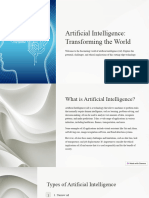0% found this document useful (0 votes)
11 views7 pagesIntroduction To AI
Artificial Intelligence (AI) aims to create machines that perform tasks requiring human intelligence, with applications in healthcare, transportation, finance, and education. While AI offers advantages like increased efficiency, it also poses challenges such as job displacement and ethical concerns. The future of AI is promising, emphasizing responsible development and the potential for human-AI collaboration.
Uploaded by
jagdishdhoni18Copyright
© © All Rights Reserved
We take content rights seriously. If you suspect this is your content, claim it here.
Available Formats
Download as PDF, TXT or read online on Scribd
0% found this document useful (0 votes)
11 views7 pagesIntroduction To AI
Artificial Intelligence (AI) aims to create machines that perform tasks requiring human intelligence, with applications in healthcare, transportation, finance, and education. While AI offers advantages like increased efficiency, it also poses challenges such as job displacement and ethical concerns. The future of AI is promising, emphasizing responsible development and the potential for human-AI collaboration.
Uploaded by
jagdishdhoni18Copyright
© © All Rights Reserved
We take content rights seriously. If you suspect this is your content, claim it here.
Available Formats
Download as PDF, TXT or read online on Scribd
/ 7
























































































